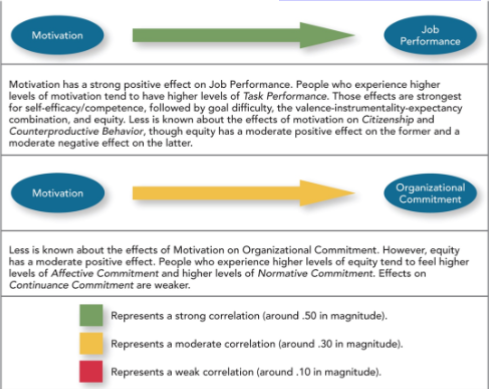Organizational Behavior - Chapter 6: Motivation
1/12
Earn XP
Description and Tags
These flashcards cover key concepts related to motivation in organizational behavior, including theories, definitions, and applications.
Name | Mastery | Learn | Test | Matching | Spaced | Call with Kai |
|---|
No analytics yet
Send a link to your students to track their progress
13 Terms
Motivation
A set of energetic forces that originates both within and outside an employee; it initiates work-related effort and determines its direction, intensity, and persistence.
Expectancy Theory
Motivation is fostered when the employee believes that effort will result in performance, performance will result in outcomes, and those outcomes will be valuable.
Effort → Performance
The belief that a high level of effort will lead to successful performance of a task.
(Expectancy Theory) Expectancy can be shaped by self-efficacy.
• Past accomplishments
• Vicarious experiences
• Verbal persuasion
• Emotional cues
Instrumentality
The belief that successful performance will result in certain outcomes.
Instrumentality
The belief that successful performance will result in
certain outcomes.
• Inadequate budget to provide outcomes, even when performance is high
• Use of policies that reward things besides
performance, such as attendance or seniority
• Time delays in rewarding good performance
Goal Setting Theory
Motivation is fostered when employees are given specific and difficult goals rather than vague or easy goals.
Equity Theory
Motivation is maximized when an employee’s ratio of outcomes to inputs matches those of a comparison other.
Psychological Empowerment
An intrinsic form of motivation derived from the belief that one's work tasks contribute to a larger purpose.
Fostered by four beliefs:
• Meaningfulness
• Self-determination
• Competence
• Impact
Realistic Job Previews
Ensuring that a potential employee understands the positive and negative aspects of the potential job.
Orientation Programs
Training during which the new hire learns more about the organization.
Mentoring
A formal or informal process by which a junior-level employee develops a long-term learning relationship with a more senior-level employee.
Effects of Motivation on Performance and
Commitment
